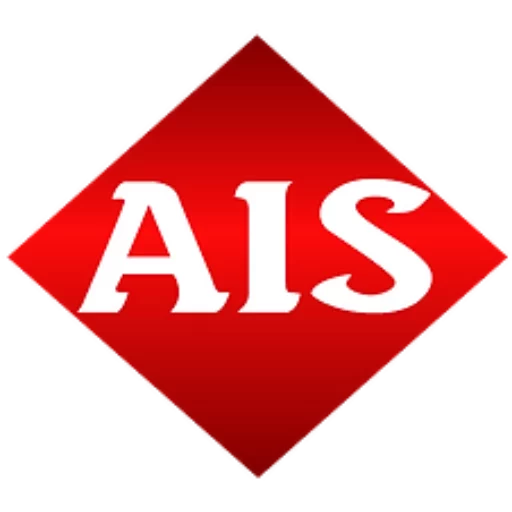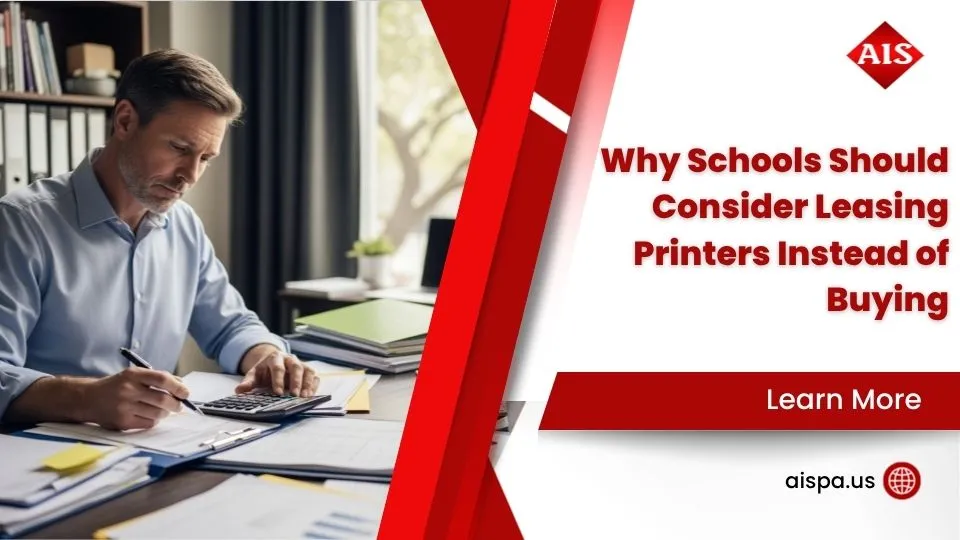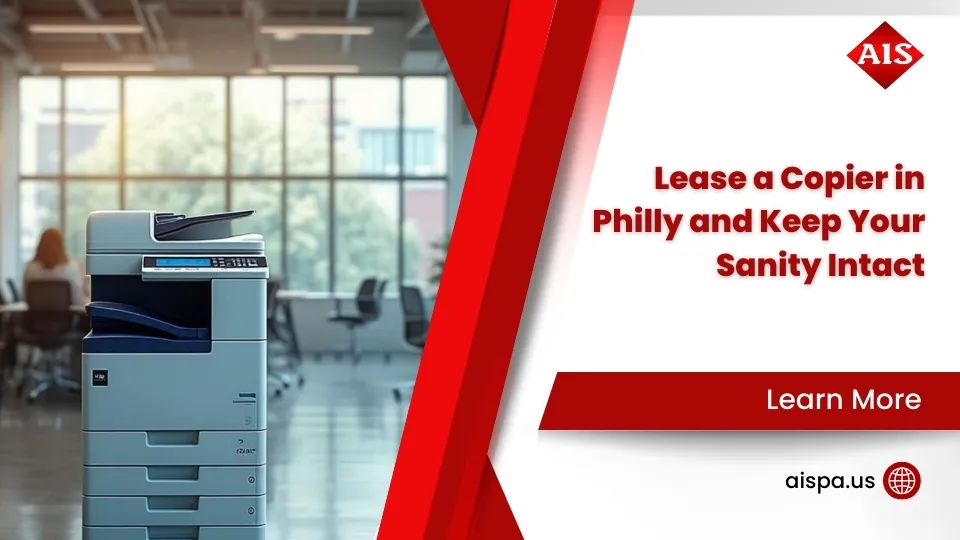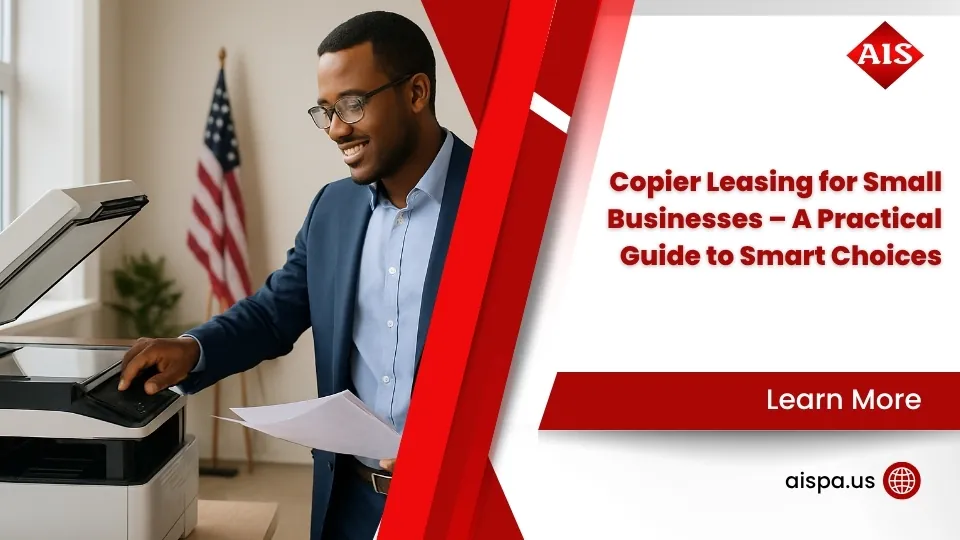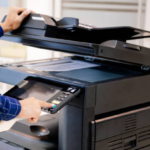Copier Leasing Demystified: A Beginner’s Guide
Leasing a copier is a financial arrangement that allows businesses to acquire modern office equipment with little to no upfront investment, while spreading payments over a fixed term of typically 36-60 months.
Quick Answer: What is copier leasing?
Copier leasing is a contractual agreement where a business pays monthly fees to use a copier for a fixed term (usually 3-5 years) instead of purchasing it outright. At the end of the lease, you can either return the equipment, purchase it at fair market value or a predetermined price, or upgrade to a newer model.
Monthly costs typically range from:
- Basic B&W copier: $50-$200
- Color multifunction device: $100-$500+
- Additional service/maintenance: ~$100/month
Are you tired of dealing with outdated office equipment that constantly breaks down and disrupts your workday? You’re not alone. For many Philadelphia businesses, the decision between buying and leasing a copier comes down to balancing immediate costs against long-term flexibility.
Eight out of ten businesses choose to lease their copiers rather than purchase them outright. Why? Because leasing preserves capital, provides predictable monthly expenses, and allows you to upgrade as technology improves—all without the headache of owning depreciating equipment.
When you lease a copier, you’re essentially paying for the use of the equipment over time, not just the machine itself. This typically includes:
- The physical copier hardware
- Regular maintenance and service
- Supplies like toner (in many agreements)
- Technical support when issues arise
For busy office managers, this means no more unexpected repair bills or technology headaches. Instead, you get a predictable monthly payment and the peace of mind that comes with knowing experts are just a phone call away.

What Is Copier Leasing?
Copier leasing is like having a subscription to equipment rather than buying it outright. Think of it as similar to leasing a car – you get to drive a new vehicle without the hefty down payment, and when the newest model comes out, you can upgrade without hassle.
There are two main flavors of copier leases to consider:
- Operating Lease: This is what most businesses choose. You’re essentially renting the equipment for a set period, and when your lease ends, you can return it, upgrade to something shinier, or buy it at whatever it’s worth at that time. This shows up as a regular expense on your books – nice and clean.
- Capital Lease: This works more like a loan in disguise. You’ll typically have a $1 buyout option at the end (yes, just one dollar!), and the copier appears on your balance sheet as both an asset and a liability.
Most businesses sign up for 36-60 month terms, with 48 months being particularly popular. It’s long enough to keep monthly payments reasonable but not so long that your copier becomes a technological dinosaur before the lease ends.
One of the biggest perks of leasing a copier is that you can walk away with brand-new equipment with $0 down. As Sarah from a local Philadelphia law firm told us recently: “We needed a serious machine but couldn’t justify dropping $10,000 upfront. By leasing, we used that money to bring on a new paralegal instead – much better for our growth.”
Security is another major advantage of modern leased copiers. With 61% of organizations having experienced at least one print-related data breach in the past year, it matters that your equipment has up-to-date protection. Every copier from Associated Imaging Solutions comes equipped with the latest security features to keep your sensitive documents safe from prying eyes.
How Leasing a Copier Works Day-to-Day
The journey of leasing a copier unfolds in four straightforward steps:
First comes credit approval. We submit your business information to our leasing partners, who typically approve established businesses quickly. Newer ventures might need a personal guarantee, but we’ll walk you through that if needed.
Next is delivery & setup. Our team brings your new equipment, installs it, connects it to your network, and configures everything to your specifications. We’ll also train your team so everyone knows how to use all the features – no more mysterious buttons!
The monthly payment part is refreshingly simple. You’ll receive a regular invoice for the same amount each month throughout your lease term. No surprises, no fluctuations – just predictable expenses you can budget for with confidence.
Finally, service calls become wonderfully straightforward. When you need maintenance or supplies, just give us a call. With a service agreement (often included in your lease), most service calls and toner replacements come at no extra charge.
“I used to dread printer problems,” admits Michael, an office manager at a Philadelphia marketing agency. “Since leasing a copier through Associated Imaging Solutions, I just make a quick call and they’re here within hours. It’s like having an IT department just for our printing needs.”
Leasing a Copier vs Owning Financial Snapshot
To help you visualize the dollars and cents, here’s how leasing stacks up against buying for a typical $10,000 multifunction copier:
| Factor | Leasing | Buying |
|---|---|---|
| Initial Cash Outlay | $0-$500 | $10,000 |
| Monthly Payment | ~$200-$300 | $0 (after purchase) |
| Maintenance Costs | Often included | $1,500-$2,000/year |
| Tax Treatment | Deduct payments as expenses | Depreciate asset over time |
| End of Term | Return, upgrade, or purchase | Continue using or dispose |
| Total 5-Year Cost | ~$12,000-$18,000 | ~$17,500-$20,000 |
| Cash Flow Impact | Predictable monthly expense | Large initial outlay |
| Obsolescence Risk | Minimal (can upgrade) | High (stuck with old tech) |
While the total cost of leasing a copier might be slightly higher over the long haul, most businesses find the benefits worth every penny. You get predictable monthly expenses, included maintenance, and the flexibility to upgrade as technology evolves – all without tying up your capital in equipment that loses value the minute it’s delivered.
Leasing vs Renting vs Buying: Key Differences
When it comes to getting a new copier for your Philadelphia business, you’ve got three paths to choose from – each with its own set of advantages depending on what your office needs.

Think of leasing a copier as the middle-ground option. You’re making a 3-5 year commitment with predictable monthly payments. The beauty here is that maintenance is typically included (goodbye unexpected repair bills!), and when your term ends, you can upgrade to the latest technology. One of our clients, a law firm in Center City, loves that they can stay current with security features without ever laying out a large chunk of cash.
Renting, on the other hand, is the short-term solution. It’s perfect when you need a copier for a few days, weeks, or months. Yes, you’ll pay more per month than with a lease, but you’re buying flexibility. Everything’s included – service, supplies, the works – with no long-term strings attached. We recently set up a temporary office for a film production company in Philadelphia with rental copiers, and they were thrilled with the hassle-free experience.
Buying is the traditional route – one big payment upfront, and the machine is all yours. You’re the captain of this ship, responsible for maintenance and repairs, but free from monthly payments. The accountants among us appreciate the asset depreciation benefits, too. As the owner of a South Philly print shop told me last week, “I wanted to own my equipment outright – it just helps me sleep better at night.”
The key difference really comes down to time commitment and who holds the title. Leasing gives you multi-year flexibility with upgrades. Renting offers freedom but at a premium price. Buying grants ownership but also saddles you with maintenance headaches and technology that eventually becomes outdated.
For those temporary needs – maybe you’re hosting a conference or managing a short-term project – check out our Copier for Rent in Philadelphia options. But for day-to-day business operations, leasing or buying typically makes more financial sense.
When Leasing a Copier Beats Renting
Leasing a copier shines brightest when your needs extend beyond the short term. Here’s when it makes the most sense:
If your equipment needs stretch past six months, the math quickly tilts in favor of leasing. I remember helping a marketing agency in Northern Liberties who had been renting for nearly a year – they were shocked to find they’d been paying almost double what a lease would have cost them!
Businesses that value predictable budgeting love leases. The monthly payment stays fixed for the entire term, making financial planning a breeze. As one Philadelphia healthcare administrator told me with a smile, “I’ve got enough surprises in my day – at least my copier cost isn’t one of them.”
High-volume users benefit tremendously from lease agreements. They typically include generous usage allowances, unlike rentals that might charge premium rates when you exceed your page limit. For businesses churning out 5,000+ pages monthly, these savings add up faster than Philadelphia potholes after a winter storm.
Technology-focused companies appreciate the refresh options built into most leases. You can upgrade to newer models midway through or at the end of your term, keeping your office equipped with the latest features without needing to dig deep into capital reserves.
When Buying Outshines Leasing a Copier
Sometimes, ownership is the way to go. Purchasing makes more sense when:
Your copier needs are basic and unlikely to change for many years. I worked with a small accounting firm that purchased a simple black-and-white copier seven years ago – it’s still running perfectly for their unchanging needs, long after a lease would have ended.
If you’ve got tech-savvy staff who can handle maintenance and troubleshooting, you might save on the service component that’s built into lease payments. One of our university clients has a brilliant IT team that maintains their purchased equipment with barely a hiccup.
Businesses needing extensive customization often prefer ownership. A Philadelphia architectural firm we partner with purchased their wide-format plotter specifically because they needed specialized software that wasn’t available on leased models. They’ve since modified it to suit their exact workflow needs – something lease restrictions would have prevented.
Companies with excess capital looking for tax advantages sometimes find purchasing more beneficial. The Section 179 deductions can make ownership financially attractive, though similar benefits can often be achieved through leasing structures as well.
The choice ultimately comes down to your specific business needs, cash flow situation, and how you prefer to manage your office technology. At Associated Imaging Solutions, we’re happy to walk you through all three options to find what works best for your Philadelphia business.
Copier Lease Costs & What Drives Them in 2025
The cost of leasing a copier varies widely based on several factors, but understanding these variables helps you budget appropriately and avoid surprises.

Wondering what you might pay for a leased copier this year? Let me break it down for you. For a basic black and white model that prints 20-30 pages per minute, you’re looking at about $50-$100 monthly. Step up to a mid-range multifunction device with speeds of 35-45 pages per minute, and the range shifts to $100-$300 monthly. Need a high-volume color production system that cranks out 60+ pages per minute? Expect to pay $300-$750 or more each month.
But what exactly drives these costs? Think of it like buying a car – the base model comes at one price, but add leather seats, a sunroof, and that premium sound system, and suddenly the monthly payment looks quite different.
Your monthly leasing a copier cost primarily depends on your print volume. Most leases include allowances – say 2,000 black and white pages and 500 color pages monthly. Go beyond that, and you’ll pay overage charges (typically 1.5 cents per additional black and white page and 8 cents per color page). It’s like a cell phone plan with data limits – stay within them, and your bill is predictable.
The device class and features dramatically impact your monthly payment too. Color capabilities alone can double your lease cost compared to black and white only. Higher print speeds, fancy finishing options like stapling or booklet making, expanded paper capacity, and advanced scanning features all push that price tag up. Think of security features as the alarm system of your copier – they add cost but protect your valuable information.
“We thought we needed all the bells and whistles,” shares Michael Thompson, a Philadelphia dental office manager. “But after discussing our actual usage with Associated Imaging, we realized a simpler model would handle our needs perfectly – saving us nearly $100 monthly.”
The length of your lease term affects your monthly payment as well. A 36-month lease will have higher monthly payments but a lower total cost over time. A 60-month lease stretches your payments thinner each month but costs more in the long run. For example, that $10,000 copier might cost about $300 monthly on a 3-year lease but only $200 monthly on a 5-year lease.
Don’t forget to factor in supplies and service coverage. All-inclusive agreements that cover toner, parts, labor, and preventive maintenance typically add $50-$200 monthly depending on usage. While this increases your base payment, it eliminates those unexpected expenses that can wreck your budget.
“We opted for the all-inclusive package when leasing a copier for our Philadelphia insurance office,” explains Operations Director James Wilson. “While it added about $75 to our monthly payment, the convenience of never worrying about ordering supplies or paying for service calls has been worth every penny.”
For a deeper dive into equipment costs, check out our guide on How Much is a Copy Machine?
Hidden Fees to Watch for When Leasing a Copier
The advertised monthly payment isn’t always the whole story. Be vigilant about potential hidden costs when leasing a copier – they can add up quickly if you’re not careful.
Delivery and installation fees can add $100-$300 to your initial costs. At Associated Imaging Solutions, we include these services at no additional cost for Philadelphia-area businesses because we believe in transparent pricing.
Watch out for return freight charges at the end of your lease. These can surprise you with $200-$500 in unexpected costs if not negotiated upfront. It’s like being charged for returning your rental car to the lot – it just doesn’t seem fair.
Perhaps the most dangerous hidden cost is the evergreen clause. These automatically renew your lease (often at the same or higher rate) if you don’t provide written notice within a specific window, typically 90-120 days before expiration. Mark those calendar reminders!
“The evergreen clause nearly cost us thousands,” recalls a Philadelphia retail manager. “We missed the notification window by two weeks and were facing another year of payments on outdated equipment before Associated Imaging Solutions helped negotiate a resolution with the leasing company.”
Some lessors pass through property tax reimbursement on the equipment, adding 1-3% annually to your costs. And if you need to end your lease early? Brace yourself for early termination penalties that typically require paying all remaining payments – a substantial sum if you’re only halfway through a 5-year term.
Saving Money on Leasing a Copier
Smart negotiation can significantly reduce your total cost when leasing a copier. Here’s how the savviest Philadelphia businesses are keeping their costs down:
First, negotiate the lease factor – essentially the interest rate applied to your lease. Even a small reduction can save hundreds over the lease term. Don’t be afraid to ask about it specifically, as many sales representatives won’t volunteer this information.
Consider refurbished equipment for substantial savings. Factory-certified refurbished copiers can cut 30-40% off lease payments while providing like-new performance and the same warranty coverage. They’ve been thoroughly tested and updated – often with very low page counts.
Keep your service separate from the lease when possible. Bundling maintenance into your lease means paying interest on service. Keeping these agreements separate allows flexibility to adjust service as needs change and can save you money in the long run.
If you have multiple locations or devices, align all lease end dates with co-terminus agreements. This strategy gives you negotiating leverage and volume discounts when it’s time to renew or upgrade.
Smart businesses also monitor and adjust copy allowances quarterly. “We finded we were paying for 10,000 color prints monthly but only using 3,000,” says Jennifer Liu, office manager at a Philadelphia law firm. “Adjusting our plan saved us nearly $150 monthly – that’s $1,800 a year just by checking our actual usage!”
For more money-saving strategies, see our guide on What to Look for When Leasing a Copier.
Understanding Your Copier Lease Agreement
A copier lease agreement isn’t just paperwork – it’s the roadmap for your relationship with both the equipment and the leasing company. Taking time to understand this document before signing can save you from headaches and unexpected costs down the road.

When you’re leasing a copier, you’ll find several important sections in your agreement that deserve your full attention:
The Equipment Description spells out exactly what you’re getting – the specific model, serial number, and any accessories included. This might seem basic, but it ensures you receive exactly what you agreed to.
Your Lease Term and Payment section locks in both how long you’ll have the equipment (typically 36-60 months) and your fixed monthly payment. This predictability is one of the biggest advantages of leasing.
Perhaps most important are your End-of-Term Options, which outline what happens when your lease concludes. These usually include:
- Fair Market Value (FMV): This gives you flexibility to either return the equipment or purchase it at whatever it’s worth at that time (typically 10-20% of the original cost). Monthly payments are lower with this option.
- $1 Buyout: Just as it sounds – you can purchase the equipment for a single dollar when the lease ends. The tradeoff? Your monthly payments will be higher throughout the lease.
- 10% Purchase Option: A middle ground where you can buy the equipment for 10% of its original cost, with monthly payments that fall between FMV and $1 buyout rates.
The Upgrade Clauses are worth their weight in gold for businesses that need to stay current with technology. These terms allow you to upgrade before your lease ends by rolling your remaining balance into a new agreement.
“We learned about lease agreements the hard way,” shares Michael Rodriguez, a Philadelphia attorney. “When leasing a copier for our law practice, we completely missed the fine print about automatic renewal. We nearly got locked into another year with outdated equipment because we didn’t notify them in time.”
Don’t overlook the Default Provisions (what happens if you miss payments) or Insurance Requirements (your responsibility to protect the equipment). These sections can contain expensive surprises if ignored.
For a deeper dive into lease terminology and conditions, check out our comprehensive guide: Understanding Your Copier Lease Agreement: What You Need to Know.
What’s Included in a Standard Lease Package
When leasing a copier, understanding what’s included helps you compare apples to apples between different vendors. Most standard packages include:
Your Basic Package covers the essentials: the physical copier itself, delivery and professional installation at your location, initial training for your team, and the manufacturer’s warranty coverage for defects.
Many businesses also bundle a Service Agreement with their lease (though technically it’s separate). This typically includes toner and supplies (you’ll still provide paper and staples), parts and labor for repairs, regular preventive maintenance visits, remote monitoring of your machine’s health, and access to technical support when you need help.
These service agreements usually specify response times through Service Level Agreements (SLAs). For most issues, you can expect next-business-day service, while critical problems that stop your workflow completely often have 4-8 hour response guarantees.
Sarah Johnson, an Office Administrator at a Philadelphia healthcare provider, tells us: “The remote diagnostics have completely changed how we manage our copiers. Often, Associated Imaging Solutions is fixing problems before we even notice them. And when something needs hands-on attention, the technician arrives already knowing what’s wrong and with the right parts in hand. It’s saved us countless hours of downtime.”
Accounting & Tax Treatment of Leasing a Copier
The financial benefits of leasing a copier extend beyond just preserving cash flow – they can create significant accounting and tax advantages too, depending on how you structure your lease.
Under current ASC 842 accounting standards, leases fall into two categories:
With Operating Leases, your monthly payments appear as simple operating expenses on your income statement and are fully tax-deductible. The lease obligation is mentioned in your financial statement footnotes but doesn’t affect your balance sheet ratios.
Finance/Capital Leases work differently – the copier appears as an asset on your balance sheet with a matching liability. Instead of deducting the lease payments, you deduct depreciation and interest expenses.

Many businesses don’t realize that Section 179 of the IRS tax code can apply to leased equipment, not just purchased items. This powerful provision potentially allows you to deduct the full cost of qualifying equipment in the year you start using it, rather than spreading deductions across the entire lease term.
“We worked closely with our CPA to structure our copier lease for maximum tax advantage,” explains the CFO of a Philadelphia manufacturing firm. “By leveraging Section 179, we deducted almost the entire cost in year one instead of spreading it over five years. This significantly reduced our tax liability when we needed it most.”
Tax laws and accounting standards change frequently, so always consult with your CPA or tax advisor before making decisions. They can help you determine whether an operating lease or capital lease makes more sense for your specific financial situation.
Choosing the Right Vendor & Avoiding Pitfalls
Selecting the right vendor is as important as choosing the right equipment when leasing a copier. The relationship will last for years, so partner with a company that delivers both quality equipment and exceptional service.
Key factors to consider include:
Service Reputation: Research customer reviews and ask for references, particularly from businesses similar to yours. At Associated Imaging Solutions, we’re proud of our 97% customer satisfaction rating across our Pennsylvania service locations.
Response Time: Ask about guaranteed response times for service calls and escalation procedures for critical issues. Our Philadelphia technicians average a 4-hour response time for urgent service requests.
Security Standards: Ensure the vendor follows industry best practices for data security, including hard drive encryption, secure print release, and proper data wiping at lease end.
Contract Flexibility: Look for vendors willing to customize lease terms to match your business needs rather than forcing you into one-size-fits-all agreements.
“After a nightmare experience with our previous vendor, switching to Associated Imaging Solutions for our copier lease was like night and day,” shares Emily Thompson, Office Manager at a Philadelphia architectural firm. “Their transparent approach to contract terms and consistent service delivery has made managing our document systems so much easier.”
For more guidance on vendor selection, see our 10 Tips for Choosing the Right Printer Leasing Company.
Checklist Before Signing a Copier Lease
Before committing to leasing a copier, review this essential checklist:
- Verify the Notice Period: Confirm how and when you must notify the lessor about your end-of-lease intentions. Ideally, negotiate a 30-day notice period rather than the standard 90-120 days.
- Secure a Performance Guarantee: Ensure the agreement includes a written guarantee that equipment consistently failing to meet manufacturer specifications will be replaced.
- Clarify Insurance Requirements: Understand what insurance you need to maintain on the equipment and whether your existing business policy covers it.
- Confirm Buyout Terms: Get the end-of-lease purchase price or formula in writing, whether it’s $1, 10%, or fair market value.
- Review Termination Options: Understand the process and penalties for early termination if your business needs change.
- Check for Automatic Renewals: Cross out or modify any “evergreen” clauses that automatically extend your lease.
- Negotiate Service Terms Separately: Keep maintenance agreements distinct from the lease to avoid paying interest on service and to maintain flexibility.
“The detailed checklist provided by Associated Imaging Solutions saved us from several potential pitfalls in our copier lease,” says Thomas Wilson, a small business owner in Philadelphia. “Their transparency about contract terms gave us confidence we weren’t going to face unexpected costs down the road.”
Frequently Asked Questions About Leasing a Copier

Let’s tackle some of the questions that pop up most frequently when businesses are considering leasing a copier. These practical concerns often make the difference between a smooth experience and unexpected headaches down the road.
What happens at the end of my copier lease?
The end of your lease doesn’t need to be a mystery. You’ll typically have three straightforward options when that date approaches:
Return the equipment to the leasing company, who will provide specific instructions for shipping or pickup. Just remember to wipe all your data from the device first—those hard drives can store thousands of previously scanned documents containing sensitive information.
Purchase the equipment if you’ve grown attached to it. Depending on your lease type, you might buy it for as little as $1, a percentage of the original cost (usually around 10%), or its fair market value (typically 10-20% of what it cost new).
Renew or upgrade your lease, either keeping the same machine at a reduced rate or stepping up to newer technology with updated features.
“When our lease was ending, Associated Imaging Solutions proactively contacted us three months before the termination date,” recalls Jennifer Martinez, Office Manager at a Philadelphia financial services firm. “They walked us through our options and helped us upgrade to a more efficient model that actually lowered our monthly payment.”
Can I upgrade or downsize during the lease?
Life happens, and business needs change. Fortunately, most leases have some flexibility built in:
When upgrading, the remaining balance on your current lease typically rolls into a new agreement for the better equipment. This process, sometimes called a “balance rollover,” lets you access newer technology without waiting for your lease to expire. Many leasing companies even offer loyalty incentives to make this transition more affordable.
Downsizing can be trickier but is usually negotiable, especially if you’re replacing one large unit with multiple smaller ones or consolidating several devices into one more efficient machine.
Co-terminus agreements are particularly helpful for businesses with multiple devices, as they align the end dates of different leases. This synchronization makes it much easier to manage equipment across different departments or locations.
“Our business grew faster than expected, and we needed to upgrade our main office copier just 18 months into a 5-year lease,” explains David Chen, a Philadelphia retail business owner. “Associated Imaging Solutions helped us roll the remaining balance into a new lease for a higher-capacity model with minimal paperwork and no disruption to our operations.”
Is leasing a copier viable for startups with limited credit?
Yes! New businesses aren’t automatically excluded from leasing a copier, though the terms might look a bit different:
Most leasing companies will require a personal guarantee from the business owner if your company has less than 2-3 years of operating history. This means you’re personally responsible if the business can’t make the payments.
Some newer businesses start with a short-term rental as a bridge solution until they establish sufficient credit history for a full lease. This approach costs more per month but requires less commitment.
Startups may face slightly higher lease rates or be asked to provide a security deposit to offset the perceived higher risk. However, these terms often improve after establishing a positive payment history.
“As a new business in Philadelphia with just six months of history, we expected to be turned down for a copier lease,” says startup founder Rebecca Johnson. “Associated Imaging Solutions worked with us to structure a lease with a personal guarantee that we were able to remove after one year of on-time payments.”
The right leasing partner will work with you to find solutions that fit your specific situation, whether you’re a well-established company or just getting started. The goal is building a relationship that works for both parties over the long term.
Conclusion
When it comes to modern office equipment, leasing a copier simply makes good business sense. That’s why 80% of businesses choose this path rather than tying up valuable capital in equipment that begins depreciating the moment it arrives.
Think about what matters most to your Philadelphia business—having cash available for growth opportunities, predictable monthly expenses, and technology that evolves with your needs. Leasing a copier delivers on all these fronts, while eliminating the headaches of ownership.
The advantages are clear and compelling:
You preserve your capital for what truly matters—whether that’s hiring talent, expanding your marketing efforts, or seizing unexpected opportunities that come your way.
Your budget becomes more predictable with fixed monthly payments that make financial planning straightforward. No more surprise repair bills or unexpected replacement costs when equipment fails.
You gain access to the latest technology and can upgrade as innovations emerge. In today’s rapidly evolving digital workplace, this flexibility is invaluable.
Maintenance and support come built into most lease agreements, meaning your team stays productive instead of troubleshooting technical issues.
Depending on your lease structure, you may enjoy significant tax advantages that improve your overall financial picture. (Always worth a conversation with your CPA!)
Here at Associated Imaging Solutions, we’ve walked thousands of Philadelphia businesses through the leasing process. We understand that every organization has unique document management needs, budget considerations, and growth trajectories. Our approach combines deep local knowledge with industry-leading standards to ensure you get the perfect balance of capability and cost.
“The team at AIS took the time to understand our workflow before recommending equipment,” shares Michael Torres, a Philadelphia small business owner. “Three years into our lease, we’re still confident we made the right choice.”
Leasing a copier shouldn’t be complicated. Our goal is to make the entire process—from selection to installation to ongoing support—as smooth as possible. We believe technology should solve problems, not create them.
Ready to explore how the right copier lease could streamline your operations and improve your bottom line? Let’s have a conversation. Our team is ready to provide a no-obligation consultation custom to your specific needs.
For complete details about our flexible leasing options, visit our Copier Lease page or reach out to our Philadelphia office. We’re here to help you make document management one less thing you need to worry about.
